Copyright © RenXSol Ecotech 2012. All Rights Reserved
Powered by QMP
Powered by QMP
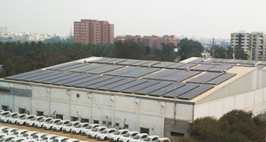
415 KW ( Largest commissioned plant in BESCOM region) at Warehouse, Parappana Agrahara, Bengaluru ,Commissioned in March 2016. Technology Designed for E-W roof.
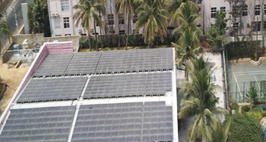
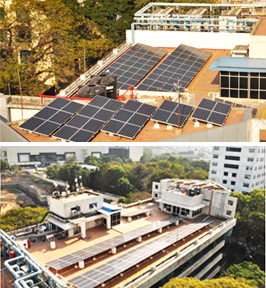
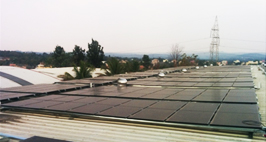
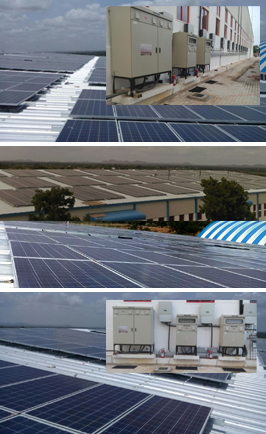
RenXSol as part of another firsts to its credit, designed, engineered, supplied, executed and commissioned in October 2015, the largest and the first net metered rooftop project of AP with successful approvals of all agencies as CEIG and APSPEDCL with bi-directional meter at Hindupur,AP. The company is amongst the largest textile firms with global clientale and took this initiative to go green in use of energy for its factory usage and exporting surplus power to grid as per AP policy. The solar power plant uses multicrystalline solar panels of 300 Wp of Gintech Energy Corporation - Taiwan with ABB string inverter technology. The project was executed in a short time with all approvals. The plant is expected to save the client in electricity bills or by export of power of about approximately Rs 2.8 lacs monthly with return on investment to client generally within 5 years. The strong engineering expertise and disciplined work force was well appreciated by all stakeholders. This will enable government provide reliable electricity to about 160 semi-urban/rural houses using 2 kW power (10 units daily) without any investment. It also enables protect the environment by reducing carbon footprint of the company by 600 kgs of carbon dioxide annually.
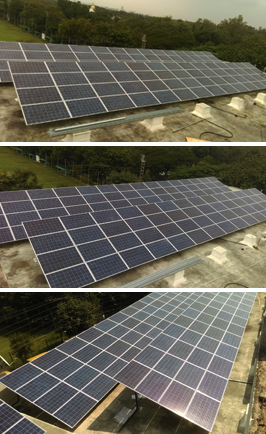
RenXSol recently had another first to its credit, with successful design, engineering, supply, installation of 100 kW rooftop power plant for a school in Pune, Maharashtra. As per the new policy notified by Government of Maharashtra in Sept 2015, this project was completed in record time of 45 days. It helps save the client about 13500 units monthly with return on investment to client within 5 years at current local tariffs. The children of the school will thus be studying using eco-friendly power and help government and society by contributing to provide power to 40 semi-urban / rural houses using 2 kW power (10 units daily), as well as reducing carbon footprint by 150 kgs annually.
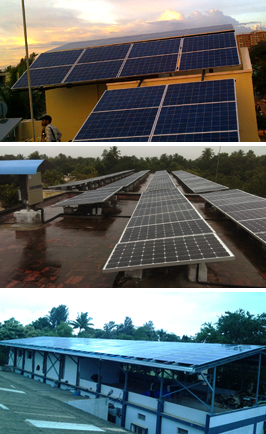
RenXSol successfully commissioned rooftop power plant of various capacities at its client locales under Karnataka BESCOM net metering policy of sizes 2 kW, 4 kW, 8 kW, 15 kW etc. The company is also executing several other rooftop power plants in Karnataka of sizes ranging from 10 kW to 1 MW totalling nearly 2.5 MW of rooftop systems with various customers and has established itself as a market leader in pioneering concepts, with strong design and engineering and high quality installations providing consistent generation and efficient after sales monitoring and support. The company has also pioneered hybrid solutions wherein benefits of both net metering and UPS back up is combined enabling users with UPS have the best of both worlds.

RenXSol successfully commissioned 5000 litres, 4 units totaling 20000 litres for a leading school in Bangalore. The system provides hot water round the clock for children staying in dormitories and hostels in a eco-friendly way. The system used latest technology flat plate collector panels with textured glass enabling high efficiency and reliability.
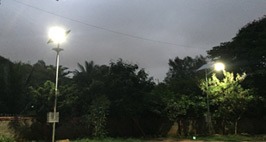
RenXSol successfully installed and commissioned 24 nos. of high efficiency 56 W LED street lights using 6 metre high poles for a leading school in Bangalore. The system provides automatic lighting from sunset to sunrise without using power from the grid. This enables children and security staff in the school be un-affected by the frequent power cuts noticed in Bangalore or during rains and cloudy days, by having well lighted roads and surroundings.
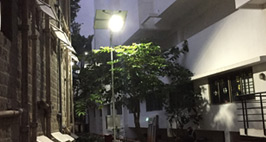
RenXSol gets new repeat orders for high efficiency LED lights for leading institution of Bangalore for its college campus. This system will provide the client un-interuppted and bright lighting for his campus forecourt area from sunset to sunrise with back up for cloudy days.
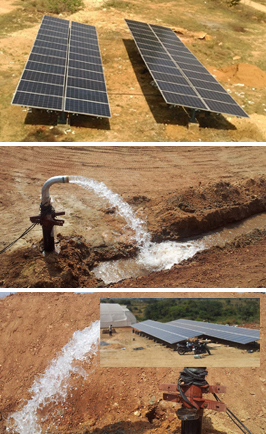
RenXSol powers AC submersible pumps of 10 HP, 12.5 HP, 15 HP, 25 HP using solar energy. The farmers who faced severe problems due to power cuts and un-reliable power, were able to depend on the solar energy to irrigate their crops and store water for future use during cloudy periods. The solar system design reliability was appreciated as it gave same discharge to farmers without affecting performance.
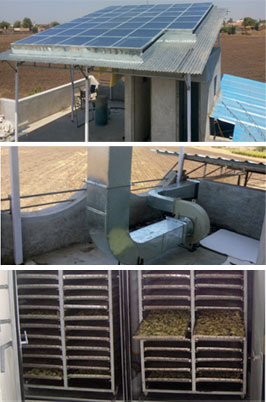
Food processing entrepreneur in Rajkot, Gujarat wanted a drying system for drying 200 Kg Onion, garlic and cucumber per day to cut down on diesel consumption used for the same. He also wanted to reduce fungus formation by reducing moisture to around 5% to improve value of produce.
40 sq. m air heating system installed with customized drying chamber with an innovative distribution design to reduce moisture from 70% to 5%.
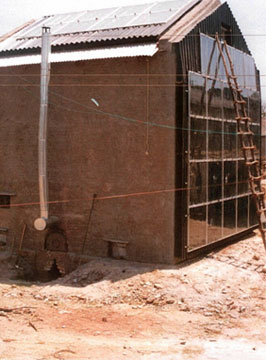
Tobacco company in Rajahmundry, AP used firewood for drying of tobacco leaves which is a mere curing process involving complex chemical and physical changes to achieve, a commercially acceptable cured leaf of lemon or orange colour. There are four stages of curing, viz.
The drying of leaves is done in a Barn (generally 16'x16'x16' approx. size). The air inside the room is normally heated by using firewood. The Solar System provides the hot air during daytime to maintain the temperature inside the barn. The fan draws the heated air through Solar panels blowing the same into the room.
"Solarwall" is fixed to all sidewalls and North & South Roof covering total area of 130 sqm. Hot air is sucked from all side and rooftop through the axial fan, allowing this air in side the barn. Glazing is fixed on top of solarwall on all sides for 130 sqm and barn is insulated in uncovered areas to reduce heat loss. Air flow from the blower is controlled by dampers
Return on investment was achieved in 6 months due to major benefit in product quality improvement
A Hassan, Karnataka plant specializing in drying coir pith, a fine granular material extracted from underneath the coconut skin. After the raw materials are assembled at the drying facility, they are soaked in water for 1 hour to remove sodium. Following this, the coir peat is dried for commercial sale; it is mechanically pressed and the moisture content is lowered to around 70%. Final drying occurs in a fluidized bed dryer which further reduces the moisture content to 20% using 6,950 L/s (25,000 m3/ hr) of ambient air heated to 105°C. The final product is extremely absorbent and buoyant, making it ideal for usage in soil replacement and oil spills.
It was important to have a drying process that would be:
It was determined that a SolarWall® solar air heating system would provide a cost-effective means for reducing diesel fuel. A 414 m2 (4456 ft2) of system was installed on the roof. Heat from the surface of the solar collector was ducted down into the burner, yielding a nominal air flow of 60 m3/h/m2 and preheating the air entering the dryer by 20°C. The system has relatively long operating hours and operates at moderate temperatures. It displaced about 14% of the heating fuel, yielding a 2 year payback.